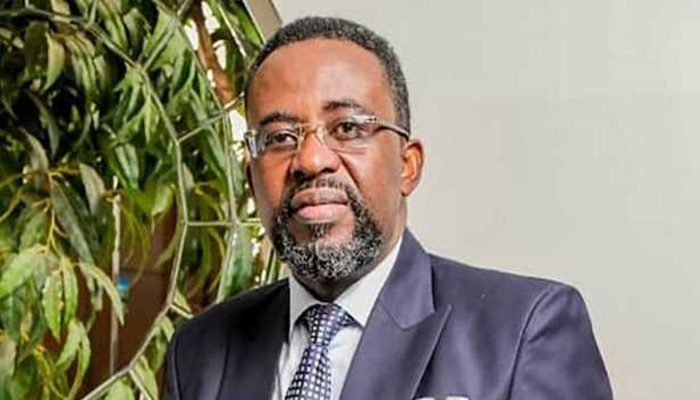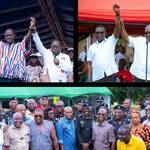Attorney General and Minister of Justice, Dr. Dominic Akuritinga Ayine, has revealed that an internal memo from the Prosecutions Division of the Attorney General’s Department, under the previous New Patriotic Party (NPP) government, had recommended dropping charges against Johnson Pundit Asiama, the newly appointed Governor of the Bank of Ghana (BoG).
Speaking at a media briefing, Dr. Ayine explained that his attention was drawn to the memo while reviewing the case. According to him, the recommendation to discontinue prosecution was made due to the factual circumstances surrounding the alleged financial loss.
However, the former Attorney General failed to act on this legal advice.
Dr. Asiama had been charged with contravening the BoG Act by granting a facility of GH₵300 million to Universal Merchant Bank (UMB) and causing a financial loss of GH₵150 million to the state.
Key findings that influenced the decision
Dr. Ayine disclosed that after reviewing the case, he found that the initial facility of GH₵300 million had been recovered, leaving only GH₵150 million outstanding.
Furthermore, the Attorney General’s Office confirmed from BoG officials that UMB Bank was actively servicing the interest on the remaining amount.
In addition, it was revealed that UMB had GH₵150 million locked up with the Consolidated Bank Ghana (CBG).
It is expected that when these funds are released, the outstanding loan would be repaid in full, negating the basis for the charges against Dr. Asiama.
Given these facts, Dr. Ayine concluded that the charges against Dr. Asiama had become moot and that continuing with the case would serve no legal purpose.
Dr Asiama’s proven track record
Dr. Asiama is widely regarded as one of Ghana’s leading economists, with a wealth of experience in monetary policy formulation, financial stability regulation, and economic research. He holds a PhD in Economics from the University of Southampton, UK, and has spent over two decades working at the BoG in various leadership capacities.
Between April 2016 and January 2018, he served as Deputy Governor of the BoG, where he played a key role in formulating monetary and financial policies to ensure macroeconomic stability.
His tenure saw significant improvements in exchange rate policies, liquidity management, and overall financial sector regulation.
His deep knowledge of Ghana’s economic landscape positions him well to lead the BoG in steering the country’s financial future.
His nomination signals a continuity of efforts to stabilize the economy while ensuring sustainable financial sector reforms.
His key areas of expertise include monetary and exchange rate policy formulation and implementation, banking sector regulation and supervision, economic research, strategic financial decision-making, risk management, and digital banking regulation.
His leadership is expected to introduce innovative policies that align with global financial trends while addressing Ghana’s specific economic needs.
Legal justification for dropping the case
Explaining his legal basis for dropping the charges, Dr. Ayine cited Rule 40(2)(a) of the Legal Profession (Professional Conduct and Etiquette) Rules, 2020 (L.I. 2423), which states that a prosecutor must refrain from pursuing a case when the evidence does not support the charges.
“The prosecutorial authority vested in me under Article 88 of the Constitution is discretionary in nature and is subject to the constitutional requirements set out in Article 296,” he stated. “I must act reasonably, fairly, and candidly, ensuring that my decisions are not capricious or biased.”
He argued that his decision was based solely on legal merit and not political considerations.
Dr. Ayine’s position on nolle prosequi
Dr. Ayine also used the opportunity to clarify his stance on the use of nolle prosequi (Latin for “there shall be no prosecution”). Traditionally, Attorneys General have not been required to explain why they enter a nolle prosequi to terminate a prosecution. However, he strongly disagrees with this view, asserting that the constitutional principles in Article 296 require him to be transparent.
“As Attorney General, my only client is the Republic of Ghana, represented by its sovereign people,” he stated.
“I intend to provide reasons for my decisions in cases where I have entered a nolle prosequi or withdrawn charges, ensuring that I remain accountable to the people.”
He further explained the legal distinction between a nolle prosequi and the withdrawal of charges.
Under Section 54 of the Criminal and Other Offences (Procedure) Act, 1960 (Act 30), the Attorney General may enter a nolle prosequi at any stage of a criminal trial, leaving open the possibility of refiling charges in the future.
In contrast, withdrawing charges under Section 59 of Act 30 results in the accused being acquitted and discharged if the prosecution has already closed its case.
Ensuring fairness in the justice system
Dr. Ayine emphasized that his decision to drop the charges against Dr. Asiama was rooted in fairness and legal ethics.
He reiterated his commitment to upholding the rule of law and ensuring that the justice system is not weaponized for political purposes.
“The best ethics of the legal profession dictate that every lawyer must act in the best interest of their client.
“As Attorney General, my client is the Republic of Ghana, and my duty is to ensure justice is served fairly and transparently,” he concluded.




